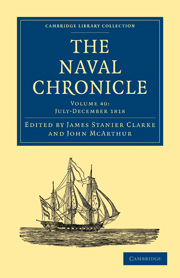 The Naval Chronicle
The Naval Chronicle Book contents
- Frontmatter
- PLATES IN VOLUME XL: From Original Design
- PREFACE TO THE FORTIETH VOLUME
- BIOGRAPHICAL MEMOIR OF SIR JOHN JENNINGS, REAR-ADMIRAL OF ENGLAND
- BIOGRAPHICAL MEMOIR OF SIR ROBERT HOLMES, REAR-ADMIRAL OF THE RED
- BIOGRAPHICAL MEMOIR OF THE LATE JAMES HINGSTON TUCKEY, CAPTAIN R.N.
- BIOGRAPHICAL MEMOIR OF THE LATE JAMES HINGSTON TUCKEY, CAPTAIN R.N.
- BIOGRAPHICAL MEMOIR OF CAPTAIN JOHN TOUP NICOLAS, OF THE ROYAL NAVY. C.B. K.C. St. F. & M.
- BIOGRAPHICAL MEMOIR OF CAPTAIN JOHN TOUP NICOLAS, OF THE ROYAL NAVY. C.B. K.C. St. F. & M.
- INDEX
BIOGRAPHICAL MEMOIR OF CAPTAIN JOHN TOUP NICOLAS, OF THE ROYAL NAVY. C.B. K.C. St. F. & M.
Published online by Cambridge University Press: 10 January 2011
- Frontmatter
- PLATES IN VOLUME XL: From Original Design
- PREFACE TO THE FORTIETH VOLUME
- BIOGRAPHICAL MEMOIR OF SIR JOHN JENNINGS, REAR-ADMIRAL OF ENGLAND
- BIOGRAPHICAL MEMOIR OF SIR ROBERT HOLMES, REAR-ADMIRAL OF THE RED
- BIOGRAPHICAL MEMOIR OF THE LATE JAMES HINGSTON TUCKEY, CAPTAIN R.N.
- BIOGRAPHICAL MEMOIR OF THE LATE JAMES HINGSTON TUCKEY, CAPTAIN R.N.
- BIOGRAPHICAL MEMOIR OF CAPTAIN JOHN TOUP NICOLAS, OF THE ROYAL NAVY. C.B. K.C. St. F. & M.
- BIOGRAPHICAL MEMOIR OF CAPTAIN JOHN TOUP NICOLAS, OF THE ROYAL NAVY. C.B. K.C. St. F. & M.
- INDEX
Summary
Thou must know
'Tis not my profit that does lead mine honour;
Mine honour, it.
Shakspeare.CAPTAIN JOHN TOUP NICOLAS is the eldest of five sons (four of whom hold commissions in the naval service), of Captain John Harris Nicholas, of the royal navy; and was born at Withen, near Helston, in Cornwall, on the 22d of February, 1788.—The family of Nicolas was originally of Brittany, in which province they possessed the Seigneuries of “La Touche,” of “Champs Gerault,” of “Plessix,” of “Clermont,” and of “Clayes;” and were ennobled before the 14th century. The representative of the second branch, being of the protestant faith, emigrated on the revocation of the Edict of Nantes, in 1685, settled at Looe, in Cornwall, and became the ancestor of the subject of this memoir.
Before we proceed to detail the public services of Captain Toup Nicolas, it may not be improper to take a brief notice of those of his father, who has lately retired with the rank of commander, after 42 years of nearly constant service.
Captain John Harris Nicholas entered the navy in 1772, and served nearly three years as a midshipman, in the Panther, of 60 guns, with the then Commodore (since Admiral) Lord Shuldham, and from thence was removed into the Orpheus, of 32 guns, commanded by the late Admiral Hudson, in which ship he remained above three years, and during that period was present at the capture of New York.
- Type
- Chapter
- Information
- The Naval ChronicleContaining a General and Biographical History of the Royal Navy of the United Kingdom with a Variety of Original Papers on Nautical Subjects, pp. 333 - 420Publisher: Cambridge University PressPrint publication year: 2010First published in: 1818


